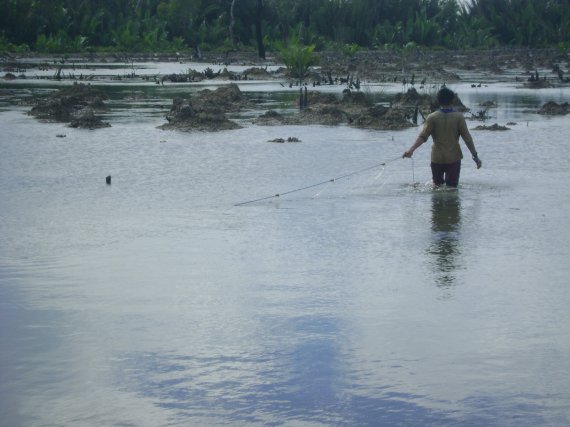This is the argument in Bambang Indratno Gunawan’s thesis, which he will defend on 2 October. He participated in research work in the Berau Delta in Borneo from 2008 to 2010. Berau is a frontier territory, says Gunawan. It is uncultivated, very extensive and has unusual ecosystems, such as mangrove forests. The rich fishing grounds, in particular, attract poor migrants to this area. In the meantime, a marine reserve 1.2 hectares big is being established since 2005. Gunawan did research into the activities of its population and how these relate to nature protection goals. His most striking discovery is the complex organization within the fishing villages. Each fisherman works in a certain way, depending on the tools used. Fishermen with trawl nets stay relatively close to the coast, and set up gill nets further out at sea. ‘Moreover, one boat often has two to three types of fishing instruments,’ says Gunawan. ‘The fishermen use these cleverly in different seasons to ensure having sufficient catch at all times.’ The set-up of the coastal community is also striking. Most of the population in Berau are Bugis migrants, an ethnic group originating from the island of Sulawesi. They have brought along a patronage system. Fishermen get loans from a patron to buy nets, and pay back by selling their catch. Besides economic support, the patronage system also leads to the formation of social and political relationships. Gunawan: ‘For example, customers vote for their patron during elections.’ The local government sometimes also gets involved in a detrimental way. Since having to support itself financially several years ago, it has been allowing fishermen from outside to fish in the area’s reserve for a price, while keeping the local population away. Enforcement is a matter of controversy since enforcement officers come from the same area and are influenced by social relationships. Gunawan: ‘I spoke to a member who knew that his own father-in-law is breaking the rules.’ New reserves would have to be established bottom-up, says Gunawan, so as to get more grassroot support. There should also be a better regard for the local population and realistic goals. ‘You cannot maintain the entire area as a reserve,’ says Gunawan. ‘The size seems to be mainly influenced by the Indonesian government’s strive to have 20 million hectares of reserves in 2020.’ Gunawan’s research belongs to the big project RESCOPAR which studies various aspects of life in Asian coastal regions. Gunawan is pleased that he had the chance to live periodically along the coast over two years. ‘This research cannot be done in one or two days. You have to really observe people in their daily lives constantly to get to know them and their values.’
The tools make the (fisher)man
Indonesian fishermen earn their incomes in various ways in a complex society. Their interests clash unduly with nature protection policies as they are hardly involved in new policy making.

